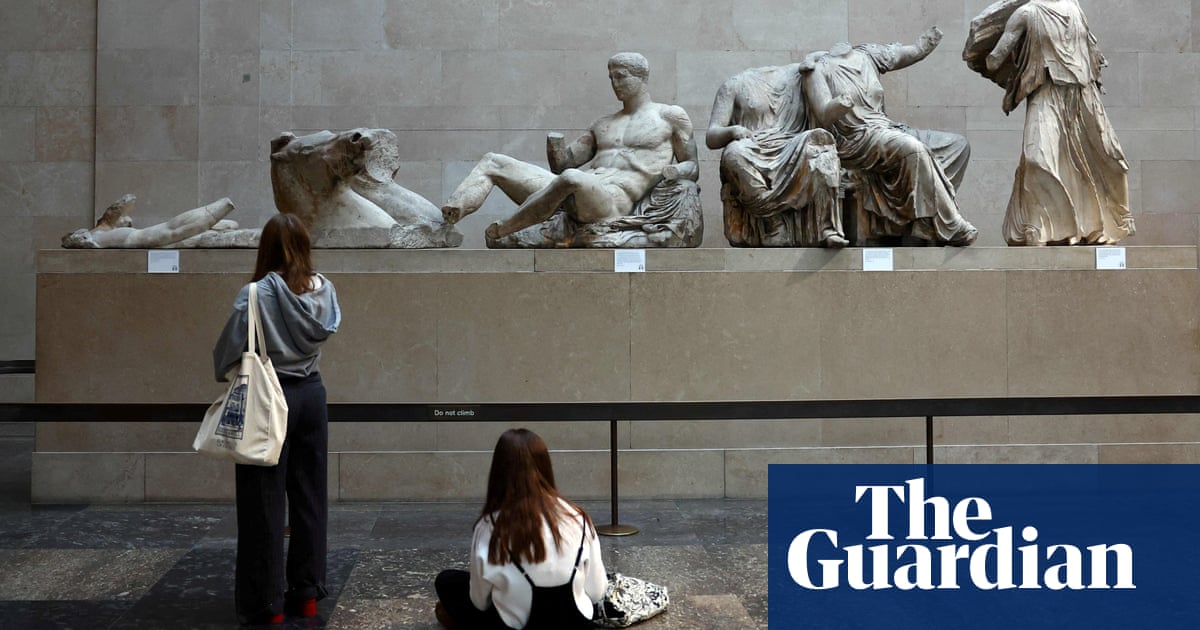
Returning the Parthenon marbles to Greece is a matter for the British Museum, Downing Street has said, apparently reversing longstanding UK government opposition to the idea, reiterated by Boris Johnson as recently as March.
Johnson met the Greek prime minister, Kyriakos Mitsotakis, at No 10 on Tuesday evening, with Mitsotakis reiterating his offer to exchange a series of treasures that had never before left Greece as rotating exhibitions for the British Museum in exchange for the marbles.
Appealing to Johnson’s background as a classicist, Mitsotakis told him he was “a true philhellene” – while insisting the Greek government did not consider the marbles question to be a “footnote” that could be forgotten or overlooked.
A No 10 statement said that when Mitsotakis had raised the marbles, Johnson “said that he understood the strength of feeling of the Greek people on this issue, but reiterated the UK’s longstanding position that this matter is one for the trustees of the British Museum”.
This has not, however, always been Johnson’s stated view about returning the 80 metres of monumental frieze sawn off from the Parthenon in 1802 on the order of Lord Elgin, Britain’s then ambassador to the Ottoman empire, which remain in London.
In an interview with the Greek newspaper Ta Nea in March, Johnson stressed that this remained the position, despite “the strong feelings of the Greek people”.
He said: “The UK government has a firm, longstanding position on the sculptures, which is that they were legally acquired by Lord Elgin under the appropriate laws of the time and have been legally owned by the British Museum’s trustees since their acquisition.”
But when Johnson’s spokesperson was asked on Tuesday what the message to Mitsotakis would be at the meeting, he said: “I won’t pre-empt their meeting, obviously, but the possession of the marbles is a matter purely for the museum. It’s not one for the UK government.”
Questioned about the apparent change to the previous UK position, he said: “The British Museum operates independently of the government. It is free, rightly, from political interference… Any question about the location for the Parthenon sculptures is a matter for them.”
A Downing Street source said that despite Johnson’s views, it had long been the official UK position that any return was a matter for the British Museum – whose new chair of trustees is the former Conservative chancellor George Osborne.
The seeming shift in approach is likely to reignite the wider debate about museums returning artefacts taken from other countries during colonial times, which UK ministers have so far resisted under the mantra of “retain and explain”.
Some regional museums have said they could repatriate disputed Benin bronzes, most of which were looted by British forces in 1897. This year Germany said it would start returning a “substantial” number of the Benin bronzes held in its museums to Nigeria.
Maintenance work at the British Museum and the pandemic have prevented the Parthenon marbles from being publicly viewed for almost a year. The Acropolis Museum, which was purpose-built to house the classical carvings at the foot of the monument in Athens, reopened in May.
Mitsotakis is particularly keen to secure the sculptures’ repatriation, having described the UK’s refusal to engage in talks as a “losing battle”.
The British Museum’s consistent view is that the sculptures were acquired legally, with Elgin receiving formal consent from the Ottoman empire to remove the section of sculptures.
“His actions were thoroughly investigated by a parliamentary select committee in 1816 and found to be entirely legal, prior to the sculptures entering the collection of the British Museum by act of parliament,” the museum says on its website.
Campaigners described the government’s new stance as a diversionary tactic.
Paul Cartledge, an emeritus professor of Greek culture at Cambridge University and vice-chair of the British Committee for the Return of the Parthenon Marbles, told the Guardian it amounted to “a sleight of hand”.
“It’s a nonsense,” he said. “Even if the trustees agreed to relinquish them, the final decision to rescind the act of 1816 which declared the Elgin Collection to be owned by the nation would legally have to go through the British parliament. There is no doubt that the pressure is building up for genuine, post-imperial reconciliation in the cultural sphere and Johnson is trying to evade it.”
Greek media said Mitsotakis had told the UK leader the marbles were “a significant issue” for bilateral relations that Athens would not be dropping.












